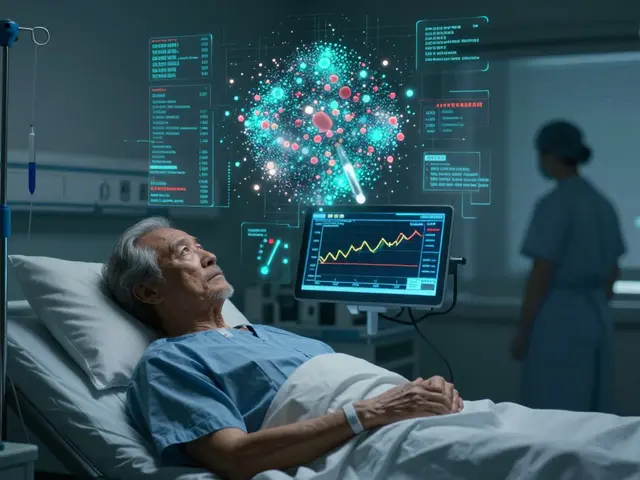Understanding Partial Onset Seizures
Before diving into the connection between partial onset seizures and traumatic brain injury, it's essential to understand what partial onset seizures are. Partial onset seizures, also known as focal seizures, occur when there is abnormal electrical activity in just one part of the brain. These seizures can be further classified into two types: simple partial seizures and complex partial seizures.
Simple partial seizures do not cause a loss of consciousness, while complex partial seizures do. Symptoms of partial onset seizures can vary greatly depending on the part of the brain affected and may include muscle jerking, strange sensations, or even emotional symptoms like fear or déjà vu.
What is Traumatic Brain Injury?
Traumatic brain injury (TBI) occurs when an external force, such as a blow to the head or a rapid acceleration and deceleration, causes damage to the brain. This damage can be temporary or permanent and can result in a wide range of symptoms, from mild to severe. Some common symptoms of TBI include headaches, dizziness, memory problems, difficulty concentrating, and mood swings.
TBI can be classified as mild, moderate, or severe based on factors such as the duration of unconsciousness and the severity of symptoms. Mild TBI, also known as a concussion, is the most common type of TBI and usually results in temporary symptoms.
Linking Partial Onset Seizures and Traumatic Brain Injury
Research has shown that there is a strong connection between partial onset seizures and traumatic brain injury. When the brain is injured, it can disrupt the normal electrical activity in the brain, leading to the development of seizures. In fact, TBI is one of the leading causes of epilepsy, a chronic neurological condition characterized by recurrent seizures.
Studies have found that people with a history of TBI have a higher risk of developing partial onset seizures than those without a history of brain injury. The risk increases with the severity of the TBI and is especially high in cases of penetrating head injuries, where an object pierces the skull and enters the brain.
Post-Traumatic Epilepsy
When a person develops epilepsy as a result of a traumatic brain injury, it is referred to as post-traumatic epilepsy (PTE). PTE can develop immediately after the injury or even several years later. The exact cause of PTE is not fully understood, but it is believed that the injury disrupts the balance of excitatory and inhibitory neurotransmitters in the brain, leading to abnormal electrical activity and seizures.
PTE can be difficult to treat, as it often does not respond well to traditional anti-seizure medications. In some cases, surgery may be necessary to control the seizures.
Diagnosing Partial Onset Seizures after TBI
Diagnosing partial onset seizures following a traumatic brain injury can be challenging, as the symptoms may be subtle or similar to other TBI-related symptoms. A thorough medical history, including details about the injury and any previous seizures, is essential for an accurate diagnosis.
In addition to a clinical examination, doctors may use various tests to diagnose partial onset seizures, such as electroencephalogram (EEG) to monitor brain activity, and imaging studies like computed tomography (CT) or magnetic resonance imaging (MRI) to visualize the brain's structure.
Treatment Options for Partial Onset Seizures after TBI
The primary treatment for partial onset seizures following a traumatic brain injury is anti-seizure medications, also known as antiepileptic drugs (AEDs). These medications help to stabilize the electrical activity in the brain and reduce the frequency and severity of seizures.
In some cases, if AEDs are not effective in controlling seizures, other treatment options may be considered, such as surgery, vagus nerve stimulation (VNS), or responsive neurostimulation (RNS).
Preventing Seizures after TBI
While it may not be possible to prevent all seizures after a traumatic brain injury, there are steps that can be taken to reduce the risk. These include taking prescribed medications as directed, avoiding triggers such as sleep deprivation and alcohol, and managing stress levels.
Regular follow-up with a healthcare provider is also crucial for monitoring the effectiveness of treatment and making any necessary adjustments.
Living with Partial Onset Seizures and TBI
Living with partial onset seizures and a traumatic brain injury can be challenging, but with the right support and resources, individuals can lead fulfilling lives. It's essential to work closely with healthcare providers to develop a comprehensive treatment plan and to utilize support services such as counseling, support groups, and occupational therapy.
Educating oneself about TBI and epilepsy and advocating for accommodations in school or the workplace can also help improve overall quality of life.
Conclusion
In conclusion, there is a significant connection between partial onset seizures and traumatic brain injury. It's essential for individuals with a history of TBI to be aware of this connection, monitor their symptoms, and seek medical attention if they suspect they may be experiencing seizures. With proper diagnosis, treatment, and support, individuals with partial onset seizures and TBI can manage their condition and lead fulfilling lives.











Molly Britt
15 May 2023 at 00:12I swear the VA is just pumping meds into vets and calling it a day. They don't even check for brain scarring properly.